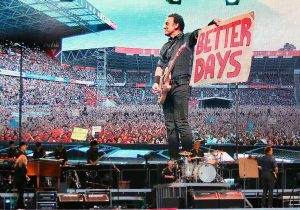
The reporting of Bruce Springsteen’s DUI arrest shows that, even if a person is presumed innocent in court, they can still be convicted in the press. In addition, Jeep’s publicized decision to pull The Boss’s Super Bowl commercial was an over-reaction. The media coverage and cancel culture are not the only problems. The evidence made public so far brings into question the propriety of Springsteen’s prosecution.
We, The Media, Find The Defendant Guilty
When the Citations and Probable Cause Statement from Bruce Springsteen’s arrest were released last week, the media machine began churning. The news was reported by sources large and small. Many of the editorials criticized The Boss, like this one from J.D. Mullane published in the Chicago Tribune:
At 21, his bust would be rock star antics. At 71, it’s foolish. Tipsy, alone, riding a motorcycle. Ranger Hayes may have saved an American legend. Or maybe it was a call for help, that Bruce is suffering on a level far deeper than we’d expect.
Mullane’s article, like so many others, presumes Springsteen is guilty. Writers, and people in general, are quick to presume guilt. ‘Reporters’ are not held to the same standard as jurors, but it makes one wonder if those people are capable of truly presuming innocence.
Jeep apparently isn’t. The company canceled Springsteen’s “The Middle” commercial (after airing it during the Super Bowl), stating, “drinking and driving can never be condoned”. Really, Jeep? Does that mean none of the Jeep leadership drives home after a glass of wine with dinner? So, maybe it can be condoned sometimes, but the cancel culture makes it popular to speak with hyperbole during knee-jerk reactions.
It is not illegal to drink and drive. It is illegal to consume alcohol to the point the alcohol impairs the driver’s ability to operate the vehicle or the driver’s blood alcohol concentration is ‘over the limit’.
Did The Park Ranger Have Probable Cause?
The first question is whether the ranger had a justification to detain Springsteen. Although he cited Springsteen for Reckless Driving and DWI, the ranger did not observe any driving. According to the ranger’s Probable Cause Statement, he observed Springsteen consume one shot of tequila, get on his motorcycle, and start the engine. The bottle of tequila was empty, but Springsteen said he had two shots in the last 20 minutes. In Ohio, the legality of this detention is questionable.
After detaining Springsteen, the ranger ‘ran him through standardized field sobriety tests’. The ranger observed ‘clues’ on the tests, Springsteen refused to complete a portable breath test at the scene, and the ranger arrested him. Given the totality of the circumstances, the arrest would likely be considered legal in Ohio.
Probable Cause Is Not Proof Beyond A Reasonable Doubt
Although Springsteen reportedly refused the portable breath test, he took a stationary (more reliable) breath test at the police station. The result was .02. That alcohol concentration is one-fourth of the ‘legal limit’ and is consistent with Springsteen’s statement that he drank two shots of tequila. The leading scientific research on the stages of alcohol intoxication suggest there is, generally, no impact at that level, and ‘intoxication’ begins somewhere between .03 and .12.
Even if the ranger had probable cause to believe Springsteen was under the influence, it takes a lot more to prove guilt beyond a reasonable doubt. To use a football analogy: the ranger only needed to get one first down. Now the prosecution has to go all the way down the field and score a touchdown against Springsteen’s defense.
Acquittal Predicted
I don’t have a working crystal ball, so I don’t know for sure if Springsteen will be found guilty. But I do have a working knowledge of DUI defense, and I think it is very unlikely the evidence will prove Springsteen’s guilt.
 Columbus OVI/DUI Attorney Blog
Columbus OVI/DUI Attorney Blog

